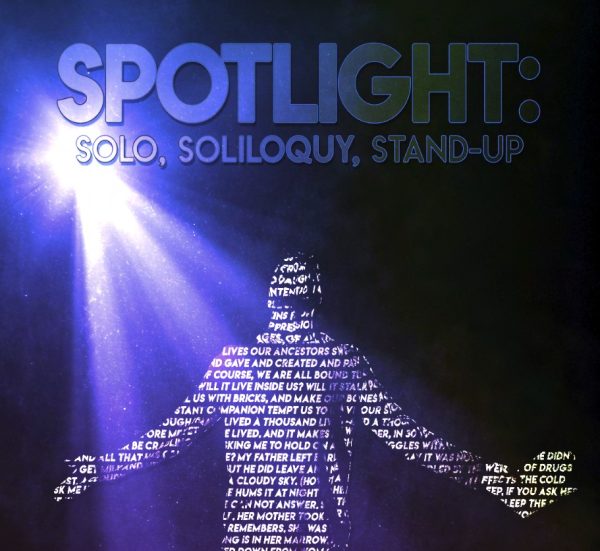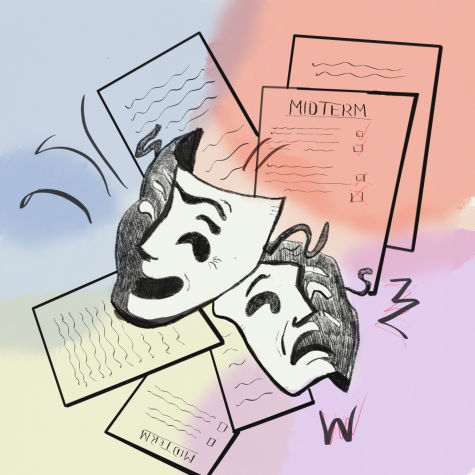Janani Balasubramanian Performs Poetry, PowerPoint
February 9, 2017
Janani Balasubramanian, one half of the spoken word duo DarkMatter and wholly themselves, performed to a packed audience in Kimball Theater on Jan. 27.
As a solo artist, Balasubramanian works within the genre of speculative fiction, and similarly incorporates highly researched science and mathematical theory into their poetry. Juniors Devon Yee and Taylor Salaguinto, who helped organize the event, relate strongly to this part of Balasubramanian’s work.
“I am similarly interested in math as social justice and math for social justice. I loved the weird similes of the science interwoven in their performance,” Yee said.
Interweaving disciplines, genres and performance styles is a huge part of Balasubramanian’s work.
“To mix genres and disciplines feels like the most natural thing in the world,” Balasubramanian said.
For many, this may not be as self-evident. However, Balasubramanian is consciously aware of this and prepares accordingly. To make their poetry accessible to their audience, Balasubramanian offers anecdotal narratives alongside the poetry. For example, Balasubramanian offered a mini-lesson with a power-point presentation on Schrodinger’s cat in order to propose that art produces alternative realities.
PowerPoint was prevalent earlier in the performance as well. In their first piece, “Predictions by the Moon from the Beginning of Time, delivered November 6th, 2016,” Balasubramanian projected a moon behind them. Seemingly familiar with the unconventionality of PowerPoint projections at a poetry reading, Janani cracked a joke.
“I’m bringing PowerPoint back as a performance form,” Balasubramanian said.
However as Janani began “Predictions,” their tone shifted. With a metered simple precision, Balasubramanian spoke the breathtakingly prophetic observations of the moon. With references to scientific discoveries, cutting-edge inventions, political movements, popular TV shows and cultural icons, Balasubramanian moved the audience through history only to stop on Nov. 8, 2016, the day Donald Trump was elected President.
“I predict that anguish will win your election on Tuesday,” Balasubramanian’s poem read.
Thus, politics, explicit or otherwise, is another prevalent aspect of Balasubramanian’s work. Senior Anna Zheng, who performed the poem “Language and Loss” with co-writer senior Brenna Two Bears as part of the event’s opening act, also finds politics as a source of inspiration. She specifically recalls her inability to express her feelings and thoughts about Trump’s election to her parents in Chinese.
“I felt disheartened and frustrated that I had lost so much of my Chinese just by not being with my parents,” Zheng said.
To confront this inability, Zheng turned towards creative composition with Two Bears. As a result, the two wove their respective experiences in an urging and haunting address about racism in the classroom, the effacement of non-European culture and reclamation of their respective mother languages. But why spoken word?
“[Poetry] is about finding ways to describe something visceral or abstract and putting it into words that makes sense to the writer or to the audience … it’s also about connecting with other people, especially when it’s performed,” Zheng said.
For Yee, poetry is also a form of political activism.
“It is inspiring to see and participate [in] art and to think about your own possibilities to create and disrupt, especially in the era of Donald Trump,” Yee said.
Whether as a form of processing and connecting or as an act of retaliation, poetry–specifically spoken word–has, in recent years, been a genre that brings conversations of gender, sexuality and race to campus (think Sister Outsider, G. Yamazawa, etc.). It is a ground-breaking genre in this sense. However, Balasubramanian’s flexibility to go from narrative to spoken word breathes humor into reimagined politicized nursery rhymes and their use of the stage (as well as PowerPoint) as performance, introduces something new.
Balasubramanian performs what it looks like for conversations about topics that pervade all aspects of our lives (i.e. politics, sexuality, gender, and race) to permeate the distinctions between discipline and genre. Yes, Balasubramanian seems to suggest, you can talk about the current political climate and then mushroom death suits in the next minute. And in any form that gets the job done, for that matter. It will be curious to see if this idea is transferable to the academic world that Whitman students operate in.









